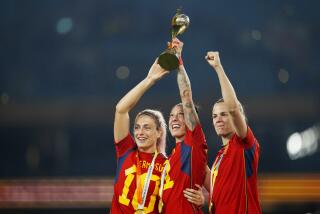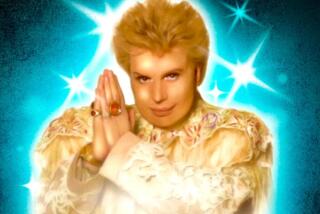WORLD CUP ’90 : Maradona Still Casts Tall Soccer Shadow
- Share via
FLORENCE, Italy — He is 5-foot-5 in his soccering feet.
He grew up in an adobe shack, in abject poverty, in the worst house of one of the worst neighborhoods of the Buenos Aires shantytown of Fiorito, where children run barefoot through the overflowing sewers to keep cool. Today he owns two Ferrari Testarossa automobiles, an Italian villa and an Argentina office building, and makes as much as $10 million per year, maybe twice that.
At age 3, he fell into a backyard cesspool, nearly drowning in the mire of raw sewage. Today he occupies high-rise Neapolitan apartments with staggering views of Mount Vesuvius, charters private jets whenever he travels and laughs off a bank robbery that costs him the largely uninsured contents of two safety-deposit boxes, including Rolex watches, precious gems, a diamond tiara and a gold medal given him by a Saudi Arabian sheik.
At age 9, he entertained huge crowds at first-division Argentina soccer games and on television variety programs, tire lessly bouncing a ball from head to toe to knee to shoulder, never letting it touch ground. Today he avoids crowds by hiring out entire restaurants to dine in peace, a la Elvis Presley, yet comprehends that since his wedding day is seen as something of a royal occasion, he might as well invite 1,200 guests, hire a renowned South American 80-piece tango orchestra to entertain, then be driven to the ceremony in a Rolls-Royce Phantom III once said to have belonged to Josef Goebbels, minister of Nazi propaganda for Adolf Hitler.
Things certainly have changed for Diego Armando Maradona.
Once he was young, frisky and fit. Now he is 30, overweight, has a bad back and has two metal screws that hold together his left ankle.
He shows up late for important training, shows up not at all for even more important exhibition games, has not one goal to show for the four 1990 World Cup games in which he has played.
But he is still Maradona.
And he is still the most famous active athlete in the world.
Argentina’s unexpected 1-0 victory over Brazil, its nearest neighbor and fiercest nemesis, Sunday in Turin was as much Maradona’s victory as his country’s, even though again he did not score. Maradona took his usual beating, but his team did not. Time after time, his chunky little body was pounded to the ground, bumped and dumped, by opponents who believed, as always, that if they took out Maradona, they would take out Argentina. The strategy failed, as did Brazil.
This was anticipated to be Maradona’s World Cup farewell, the final appearance by the sporting world’s most talked-about athlete in the world’s most talked-about sport. Now, however, there is at least one more game to play for the man who almost single-handedly won the 1986 Cup--a man who probably won’t be around for the 1994 event in the United States, which is one of the few places on the globe where Maradona could walk the streets without being mobbed.
“I believe in miracles,” Maradona said before the Brazil game. “Sometimes they can happen.”
So, perhaps he can pick himself off the ground once more and keep playing four more years.
After the year he has just endured, however, this is doubtful. The pay is high, but so is the cost. Maradona has been heckled and ridiculed, been fined and scolded, been portrayed as arrogant and aloof, been accused of every public figure’s nightmare from allegedly fathering a baby to punching a teen-aged boy’s face, been robbed, been fearful of Mafia intrusion into his life, even been voted the “ugliest player in soccer” in a poll of women taken by an Italian magazine.
His life has taken turns so grim that another magazine once advertised that it had exclusive nude photographs of his wife. When the magazine was unsealed and the pages turned, there was Claudia with her shirt unbuttoned--nursing her child.
Maradona elicits little sympathy. As with many who earn millions, drawbacks are expected by some to come with the territory. His occasional misbehavior, his absences, his excuses are tolerated by team officials who are not hypocritical about applying double standards to superstars. Teammates take pains to insist that Maradona is still one of the guys, a team man who will be there come match day. Most feel privileged to play by his side.
Can he still play as he once did? No one can be sure. Maradona’s health being what it is, who knows whether his failure to score goals, or his willingness to lag behind on the field for long periods of time, is related to his general well-being or to his general attitude. He was out of shape before the tournament, yes. On the other hand, doctors have said that he should not be playing at all, and would barely be walking without the regular doses of cortisone they administer.
Always, Maradona creates excitement and controversy. When word reached Naples that the local soccer club might do the unthinkable and purchase Maradona’s contract from Barcelona, Spain, the population went wild with anticipation. One day a report circulated that the deal was about to go sour. Dozens of Naples fans chained themselves to the stadium gate, vowing not to budge until they heard different.
It was their dream come true, if not their doing, that Maradona was signed to a monstrous contract guaranteeing him $23 million over nine years (including $6.4 million up front), scads of bonus incentives including cuts of ticket and souvenir sales and exclusive travel arrangements not available to other members of the team. Maradona also signed lucrative contracts with Puma shoes and Coca-Cola, and began charging as much as $20,000 for interviews and “private-life” photographs.
Greed naturally became one of his critics’ targets. And it was difficult even for teammates to defend Maradona when he bypassed a World Cup training engagement against Scotland because he wanted to fly to Tokyo for one of his shoe company’s endorsements. Or when he turned up three weeks late for his Naples team’s training camp because he and his father were in Argentina, fishing.
Maradona is a mystery. His success in the 1986 World Cup, in which he scored four picturebook goals, is well-documented. Twice he has led Naples to league championships, which for some fans excuses his private eccentricities. And when Maradona accused Italians of rigging the World Cup draw to assure themselves the easiest first-round competition, attracting vicious criticism, a Milan newspaper rushed to his support.
Maradona was prepared for the worst when Argentina had to play Brazil. The loss to Cameroon in the tournament’s first game led more than one person to believe that Argentina’s defending champions were in no way capable of defeating the Cup’s top contenders.
But Maradona said beforehand: “I believe in miracles. Sometimes they can happen.”
He took two days off before the game, resting his bruised, weary body. All this got him was more suspicion, more abuse. “I read that some people do not even believe in my injury, that I invent it,” Maradona said. “This is absurd. I am getting better, and I will play, but the pain remains. If I had to play at this very moment, I could not. But, on match day, I will play.”
He played. And the Brazilians had to beware of his every step. And while they did, another Argentina player scored the game’s only goal.
So, Maradona plays on. He says when the World Cup ends, and his league contract with Naples expires, he would like to return to Argentina, to a local junior team, and play for nothing more than the fun of playing.
Few believe he will do this. But what Maradona does is often the object of disbelief.
More to Read
Go beyond the scoreboard
Get the latest on L.A.'s teams in the daily Sports Report newsletter.
You may occasionally receive promotional content from the Los Angeles Times.







